Underground contamination: Not a drop worth drinking in Qambar-Shahdadkot
A survey conducted reveals that around 20 villages of the district are supplied with unclean water
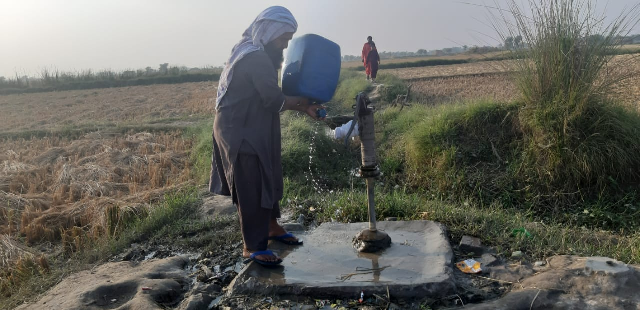
PHOTO: EXPRESS
The Express Tribune recently carried out a survey in 20 villages of Bohar Union Council which revealed that water, obtained through pumps installed in homes, is salty and brackish. Water samples were collected from all the 20 villages and a TDS meter, which indicates the total dissolved solids (TDS) of a solution, was used to check the quality of water. Shockingly, 95 per cent of samples were found to be unfit for human consumption.
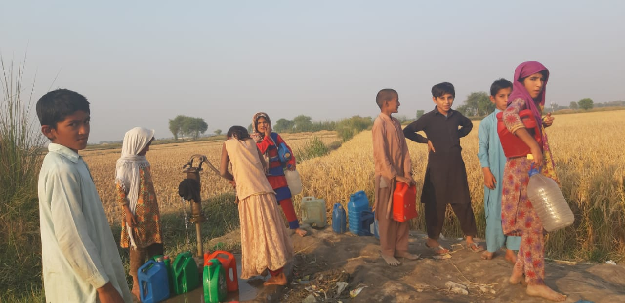 PHOTO: EXPRESS
PHOTO: EXPRESSThe bad quality and taste of water compel villagers to use pumps installed far away from the village, particularly in agricultural lands or near the banks of canals as the quality and taste of water there is comparatively better, as shown by the TDS meter.
The survey showed that in Thorhi Bijar village of Qambar tehsil, not a single house out of a total of 400 houses had access to clean drinking water. Per the meter reading, the concentration of TDS in water obtained from the village ranged from 1,500 to 3,500 parts per million (PPM) against the normal level of 150 to 300 PPM.
Punjab govt drafts plan to provide clean drinking water
“We used to get fresh water in our homes a long time ago. Unfortunately, water from both the well and the hand pump in our house has turned brackish and there is also an unpleasant smell in the water,” said Abdul Malik, a villager. “My entire family has to walk for miles to get water from the hand pumps set up in agricultural lands. In the summer, we have to go there thrice a week while in winter, we make one trip per week to the pumps to fulfill our drinking needs.”
Inamul Haq, a primary school teacher from the village, insisted that his hand pump provides good quality of water as compared to the rest of the village. However, his claims were proved to be false as the meter showed 2,600 PPM of TDS in the water - far beyond the normal range.
“My wife has a stone in her right kidney. I have no idea whether it is because of the water or because of some other reason. From today onwards, we will give up drinking water from our hand pump,” he said.
The villagers said that many of them suffer from kidney-related diseases, but due to lack of awareness and resources, they have resigned themselves to fate instead of demanding a solution.
“I am suffering from kidney disease but Allah will help me,” said Sharaf Uddin, a farmer.
Meanwhile, hundreds of people were seen queuing near hand pumps located next to a canal in Ghailo Khoso village during the survey. The hand pumps are the only sources of freshwater for the entire village, comprising about a hundred households.
The TDS level of the water obtained from the hand pumps stood at 400 PPM, while around 20 samples were collected from throughout the village to check the contamination level. The results revealed that all the samples had a TDS level ranging from 2,000 PPM to 3,100 PPM, making the water completely unfit for consumption.
Similarly, drinking water samples collected from Drigh Soomar Chandio, Gharhi Kartio and Chana, among other villages, were found to be contaminated. Most of the people in these villages, though, are compelled by poverty and a lack of resources to drink this unclean water.
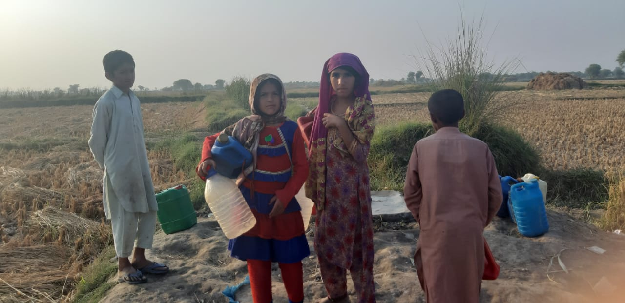 PHOTO: EXPRESS
PHOTO: EXPRESS“There is a dire need to conduct a survey on kidney patients in this district because contaminated water has aggravated the problem in almost every village,” said Dr Lal Mohammad Junejo, who works at the Basic Health Center (BHU) located in Thorhi Bijar village. “Every day, we receive many patients with complaints of diarrhoea and kidney problems.”
Speaking to The Express Tribune, some local activists demanded that the government provide them with solar-based reverse osmosis (RO) plants or drinking water schemes so that people can have access to clean drinking water.
In Mutlan, WASA to begin work on seven new schemes
“We have heard that the Sindh government is providing RO plants to BHUs and government schools. We request the authorities concerned to provide us with one of them for our BHU too,” Dr Junejo said.
The majority of the people who spoke to The Express Tribune complained that their elected representatives had never visited them after the last general elections. Per sources, Aamir Magsi of the Pakistan Peoples Party (PPP) had won the national assembly seat, while Sardar Chandio was elected as a member of the provincial assembly from the constituency.
Despite numerous attempts, neither Magsi nor Chandio could be contacted. However, the chairman of the Qambar district council, Qasim Khoso, said that the government could not provide RO plants or any other water schemes in the affected villages due to a lack of resources and funding.
Published in The Express Tribune, December 19th, 2019.





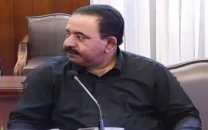
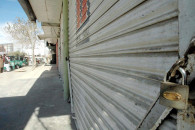












COMMENTS
Comments are moderated and generally will be posted if they are on-topic and not abusive.
For more information, please see our Comments FAQ